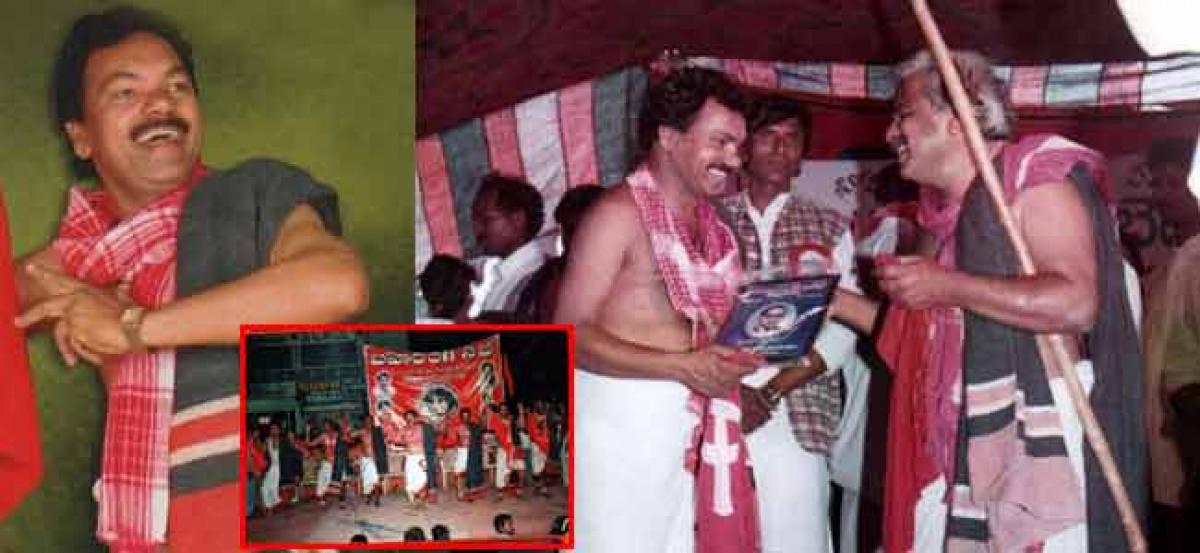Live
- Yashoda Medicity organizes “Crown of Courage” ceremony to honor Cancer Survivors
- NCB, Gujarat ATS seize 500 Kg of drugs in joint op in Porbandar
- Senior citizens of all states to get 25pc bus fare concession in Andhra
- India’s total exports likely to surpass $800 billion in coming months: Industry
- Almost half of injury-related hospitalisations in Australia caused by falls: Report
- Tribals ignored by past regimes, remain top priority in NDA govt: PM Modi in Jamui
- South Korea: Opposition leader sentenced to suspended prison term for violating election law
- Ajinkya Rahane to lead Mumbai in Syed Mushtaq Ali Trophy
- My thought process and motivation have always been team first: KL Rahul ahead of IPL 2025 auction
- 'You’re going to get dropped': Warner issues warning to Fraser-McGurk after dire ODI campaign
Just In

Writers, singers, poets and performers with revolutionary ideas have been playing the role of inspiring people’s minds since time immemorial in Telangana, which makes this region a ‘land of struggles and movements.’
Writers, singers, poets and performers with revolutionary ideas have been playing the role of inspiring people’s minds since time immemorial in Telangana, which makes this region a ‘land of struggles and movements.’ Art and music had a very special role to play in the separate statehood movement for Telangana as well. While many of these artistes, writers and performers got elevated politically and received plum posts in the government, ultimately jumping from one extreme to the other with respect to their ideology and purpose, here is one balladeer who continues to stand by the side of the underprivileged and oppressed sections.
His ‘gajjelu’ haven’t gone quiet, the tone in his voice is still roaring in defiance against anti-people’s policies of governments. His tunes continue to give goose bumps, striking the deepest chords of his listeners and his pen continue creating waves in an ocean of thoughts. He is none other than Nissar the Balladeer of Telangana- a revolutionary thinker, poet, singer, dancer, story writer, and a bus conductor working in BHEL depot.
Mohd Nissar Ahmed was born in the only Muslim family of Suddala village in erstwhile Nalgonda district (now in Jangaon district). Even as a child, Nissar was greatly influenced by Suddala Ashok Teja – the award-winning Telugu film lyricist - and his father Suddala Hanumanthu, a revolutionary writer who participated in the movement against the Razakars.
After completing his SSC in 1979, due to the poor financial situation in his family he decided to migrate to Hyderabad and get a job to survive. With help from his elder brother, he started working in Hyderabad as a lorry cleaner and then became a driver.
In 1983, he saw Gaddar the balladeer performing for the first time in his life. The first song he wrote was in 1987 when he was a lorry driver. The song “chuttoo pakkala ekkada choosina pottalalo aakali mantalu, chuttukunna pegulani thalapettuthunnayi, busagotti levamannayi thoda gotti saagamannayi” explains how he felt when he saw huge inequalities existing in the society from his observations while travelling.
In 1989, he joined RTC as a bus conductor. This was the turning point in his life. He used to attend workers’ union meetings and was greatly influenced by the work of Centre of Indian Trade Unions (CITU), which was very active then. During his almost three-decade-long service in RTC, he wrote several songs and short stories.
He became an expert in singing ballads called ‘palle suddulu,’ comprising 20-30 minute performances on issues ranging from education, health, law and order, agriculture, women’s issues, child labour and so on.
“Na jilla Nallagonda, naa thalli sallagunda,” was a song he wrote on his native district. The most famous of his songs which became a household song was ‘pandu vennelalona,’ which questioned how life in villages had changed under the imperialist rule of Andhra capitalists.
He also wrote a song on a Chief Minister when there was a murder attempt on Gaddar by the all-powerful state. Due to that, he had attracted resentment from his own political circles, as the Communist parties had tied-up with the ruling TDP back then.
However, this didn’t deter him from expressing what he felt was the truth which he wanted to convey to the masses. ‘Nissar paata,’ a book on his songs was published along with CD in 2009. His songs continue to be played in public meetings of political parties till date. When asked why writers, singers and performers were becoming silent once they get political posts, Nissar told The Hans India that though artistes were good at expressing their views about the happenings in the society, there is lack of leadership among them, which according to him, is the problem.
When asked about what was challenging about performing ballads, he said that singing, dancing and performing all these acts simultaneously requires lot of energy and therefore challenging.
When asked whether the traditional Telangana art form risks becoming extinct just like ‘burra kathas and hari kathas,’ he replied that forms of the art could change, style could change and slang could change, but the desire to work for the society, culture of the society and the goal would never change.
Nissar the balladeer is presently the State Secretary of Telangana Praja Natya Mandali and a National Council Member of Indian People’s Theatre Association. Just like any other day, he wears his khaki uniform and boards a bus with a ticket issuing machine in his hand and a leather purse hanging down his shoulders. He issues tickets and handles one of the most thankless professions in the public sector, humming tunes while working, much to the amusement of passengers. He is scheduled to formally retire from service on December 31, 2020.
Dr Mohammad Abbas

© 2024 Hyderabad Media House Limited/The Hans India. All rights reserved. Powered by hocalwire.com







